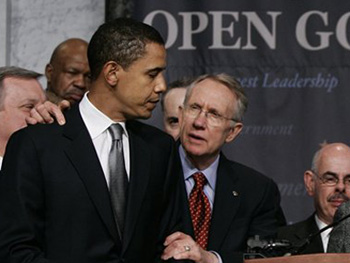
U.S. Senate Majority Leaders seem given to racist comments. Here’s Trent Lott, a Republican, in 2002, embracing segregationist policies:
“I want to say this about my state: When Strom Thurmond ran for president, we voted for him. We’re proud of it. And if the rest of the country had followed our lead, we wouldn’t have had all these problems over all these years, either.”
This is an account of current Senate Majority Leader Harry Reid during the presidential campaign of 2008, detailed in a new book:
He was wowed by Obama’s oratorical gifts and believed that the country was ready to embrace a black presidential candidate, especially one such as Obama — a “light-skinned” African American “with no Negro dialect, unless he wanted to have one,” as he said privately. Reid was convinced, in fact, that Obama’s race would help him more than hurt him in a bid for the Democratic nomination.
Reid, like Lott, has apologized for his comments. Lott then resigned his post. Reid hasn’t. Should he?
GOP chairman Michael Steele said if it had happened to a Republican, Democrats would “call for his head.” Democratic Party chairman Tim Kaine says the remarks should not affect Reid’s leadership position.
During an appearance on WCCO on Sunday, Sen. Amy Klobuchar, D-Minn., agreed. “Sen. Reid has put it out there, he’s apologized, and he called President Obama,” she told WCCO’s Esme Murphy. “I think it’s significant since the president is the one he was talking about, I think it’s significant that the president said the book was closed. I know Sen. Reid has also caused over 30 African American leaders and has apologized to them.”
Is there a double-standard here? It’s an answer the Democrats have yet to perfect.
When a politician begins an answer to a question with, “Let me respond to that this way…”, they’re buying time and searching for an answer. It’s also a flag that they’re about to say something spectacularly wrong. Sen. Diane Feinstein did not disappoint during an appearance this morning on CBS’ Face the Nation, when she was asked if Reid, like Lott, should resign.
“I don’t think so. First of all, all of us are imperfect,” Sen. Feinstein said. “The president has accepted the apology and the matter should be closed.” She then said when Lott’s controversy raged, “I saw no Democrats jumping out there and condemning Senator Lott.”
Sounds like an invitation to head for the News Cut Wayback Machine. We’ll set it for 2002.
“Trent Lott made a statement that I think is a racist statement, yes. That’s why I think he should withdraw those comments or I think the United States Senate should undertake a censure of those comments.” —Al Gore
“I could not believe he was saying what he said. StromThurmond was one of the best-known segregationists. Is Lott saying the country should have voted to continue segregation, for segregated schools, ‘white’ and ‘colored’ restrooms? . . . That is what Strom Thurmond stood for in 1948.”– Rep. John Lewis, D-Georgia.
“It is profoundly disturbing that Sen. Lott’s statement last week was not an isolated incident. Such statements were unacceptable in 1980, and they are no less so today,” – Senate Democratic leader Tom Daschle.
”I simply do not believe the country can today afford to have someone who has made these statements again and again be the leader of the United States Senate.” Sen. John Kerry.
“When connected to past comments and votes, this statement casts a dark shadow over Sen. Lott’s ability to be a credible party leader.” – Sen. Diane Feinstein.
Not the same thing, argues Joe Klein at “the Swampland.”
But it is just so much baloney to find moral equivalency between Reid’s support of a black man for President (in large part because Obama–light-skinned, militantly middle class–defied the racial caricature) and Trent Lott’s wistful regret that Strom Thurmond, a stone segregationist for most of his career, hadn’t been elected President. These sentiments, both crude, are at the opposite ends of the political spectrum: Reid stands for the ultimate symbol of racial equality, a black man as President; Lott would have voted for a candidate who wanted black people at the back of the bus.
Reid’s comments were documented in a book, “Game Change,” by Time Magazine’s Mark Halperin and New York magazine’s John Heilemann. The book is to be released on Monday. In it, Reid’s comments overshadowed those of former President Bill Clinton. According to the authors, Clinton tried to convince Ted Kennedy to support his wife’s presidential campaign. Kennedy recoiled when Clinton told him that if it had been a few years earlier, Obama would be serving the pair coffee.
